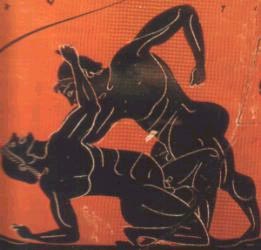



Ancient Greek word meaning "contest."
There were many types of agon in ancient Greece -- athletic and non-athletic.
But when we use the term Agon in the Alliance, we're most often referring to the athletic Agon, which was celebrated gymnoi or nude at the great religious-athletic festivals such as the Olympics, and which was, according to the Oxford Classical Dictionary,
one man's strenuous physical struggle to overcome another.
So the Gymnikos Agon was and to us is a one-on-one contest, usually in the form of one of the three classic Fight Sports -- wrestling, boxing, or pankration -- which today is often called mixed martial arts.
And the crucial elements are that it is one-on-one -- not a team sport; a Fight; and nude.

As one authority has said,
The Games gave birth to yet another Greek idea, a whole attitude to life -- the attitude of a free man competing with his peers, naked, unfettered by any element foreign to his own body, conforming only to the rules of the game, with the sole aim of winning for himself an olive crown -- in other words a purely moral victory -- and the praise of his fellow men.
~ Andronikos, The Greek Museums, 186
Both the Fight and the Victory then are an expression not only of the Man's physical prowess but of his moral qualities as well -- his Manly Excellence, Manly Goodness, Manly Virtue -- what the Greeks called Areté;
and which all ultimately mean -- Manhood.
Fighting Manhood.
Which is Moral Manhood.
Please note: in addition to the Fight Sports, there were other nude athletic events in ancient Greece, which people today would call track and field.
But, again, in the Alliance, when we speak of the Agon, we're usually talking about Fight Sport -- a one-on-one, nude male, struggle.
All three elements have to be there.
And the idea of struggle or strife is core.
As the Greek philosopher Heraclitus said:
Strife is the father of everything.
Finally, there's a Greek God named Agon.
As a God, just as Ares is the personification of war, so Agon is the personification of gymnikos agon -- of nude athletic contest.
And Pausanias tells us that at Olympia, there was a statue "of Ares with Agon at his side."
See also Areté; Athlos; Natural masculinity; and Natural male sex aggression.
